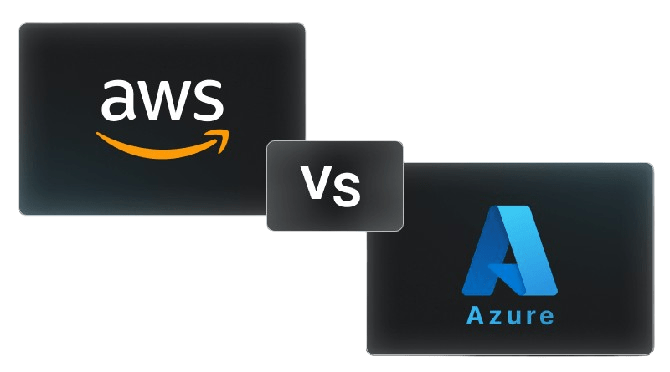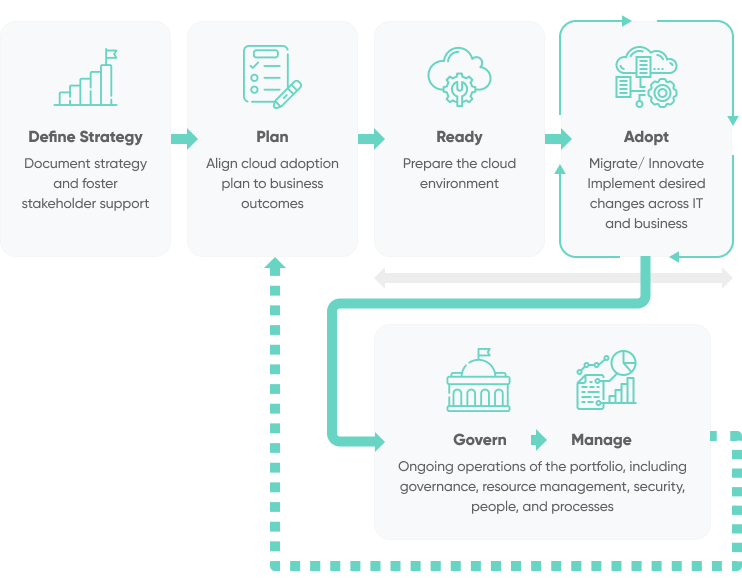
- Introduction to AWS and Azure Certifications
- Overview of AWS Certification Tracks
- Overview of Azure Certification Tracks
- AWS Solutions Architect vs Azure Solutions Architect
- AWS DevOps Engineer vs Azure DevOps Engineer
- AWS Data Engineer vs Azure Data Engineer
- Exam Cost and Difficulty Level Comparison
- Job Opportunities and Salaries
- AWS vs Azure: Enterprise Adoption and Beginner Accessibility
- Tips for Preparing for AWS and Azure Certifications.
- Conclusion
Introduction to AWS and Azure Certifications
As the cloud computing industry grows, cloud certifications have become an essential part of the career development roadmap for IT professionals. Amazon Web Services (AWS) and Microsoft Azure are the leading cloud platforms, and obtaining certifications can significantly boost one’s career. AWS and Azure offer a wide range of certifications covering various areas of cloud services like architecture, development, operations, data, and more. This article explores the differences between AWS and Azure certifications, compares key roles like Solutions Architect, DevOps Engineer, and Data Engineer, and helps you decide which certification might fit your career goals.
Overview of AWS Certification Tracks
AWS offers a comprehensive certification program that is widely recognized across industries. The certification tracks validate your expertise in various cloud computing areas. AWS certifications are divided into four primary levels:
Foundational:
- AWS Certified Cloud Practitioner: This entry-level certification is ideal for beginners new to the cloud and AWS. It covers basic cloud concepts and AWS services.
Associate:
- AWS Certified Solutions Architect – Associate: Focuses on designing distributed applications and systems on AWS.
- AWS Certified Developer – Associate: Targets software developers who want to demonstrate their skills in developing and maintaining applications on AWS.
- AWS Certified SysOps Administrator – Associate: Designed for system administrators managing cloud infrastructures on AWS.
Professional:
- AWS Certified Solutions Architect – Professional: Advanced-level certification for experienced architects.
- AWS Certified DevOps Engineer – Professional: Focuses on automating and managing AWS infrastructure and application.
Specialty:
- AWS Certified Advanced Networking – Specialty
- AWS Certified Big Data – Specialty
- AWS Certified Machine Learning – Specialty
- AWS Certified Security – Specialty
Overview of Azure Certification Tracks
Microsoft Azure offers a robust certification program aligned with its cloud services, structured across different expertise levels. At the Fundamentals level, the Microsoft Certified: Azure Fundamentals certification is ideal for individuals new to cloud computing or Azure. The Associate level includes several role-based certifications: Microsoft Certified: Azure Administrator Associate, designed for IT professionals managing Azure resources, networks, and storage; Microsoft Certified: Azure Developer Associate, aimed at software developers building cloud applications; Microsoft Certified: Azure Security Engineer Associate, which focuses on implementing security measures; and Microsoft Certified: Azure AI Engineer Associate, tailored for engineers working with AI solutions. At the Expert level, Microsoft Certified: Azure Solutions Architect Expert is for professionals designing cloud infrastructure and solutions, while Microsoft Certified: Azure DevOps Engineer Expert is suited for those working in DevOps environments. Additionally, Azure offers Specialty certifications, including Microsoft Certified: Azure AI Fundamentals and Microsoft Certified: Azure Data Scientist Associate, catering to niche areas of expertise.
AWS Solutions Architect vs Azure Solutions Architect
AWS Solutions Architect and Azure Solutions Architect certifications focus on designing cloud architectures but differ in the platforms and tools used.
- AWS Certified Solutions Architect is aimed at professionals who can design distributed systems on AWS and ensure they are scalable, secure, and cost-efficient. The certification requires knowledge of services like EC2, S3, VPC, and RDS.
- Microsoft Certified: Azure Solutions Architect Expert focuses on designing cloud infrastructure and applications in Azure, including Azure Virtual Machines, Azure Blob Storage, Azure Networking, and Azure Active Directory. While both certifications involve similar skills, the tools and approaches for each platform differ. For example, AWS relies on services like Elastic Load Balancing (ELB), while Azure uses Azure Load Balancer for similar functionality.
- AWS Certified DevOps Engineer validates your ability to automate and manage the AWS environment. It covers AWS Cloud Formation, Elastic Beanstalk, Code Deploy, Code Pipeline, and AWS Lambda.
- Microsoft Certified: Azure DevOps Engineer Expert tests your ability to design and implement DevOps practices on the Azure platform, including Azure DevOps Services, Azure Pipelines, and Azure Resource Manager (ARM) templates.
- AWS certifications generally cost around $150 for the foundational and associate-level exams, with professional-level exams costing $300.
- Azure exams are generally priced at $99 to $165, depending on the certification level.
- AWS certifications tend to be slightly more expensive at the professional level, but both AWS and Azure exams offer a similar difficulty progression from beginner to expert.
- AWS Certified Solutions Architect: $120,000 – $150,000 per year
- Azure Certified Solutions Architect: $110,000 – $140,000 per year
- AWS Certified DevOps Engineer: $130,000 – $160,000 per year
- Azure DevOps Engineer: $120,000 – $150,000 per year
- AWS Certified Data Engineer: $120,000 – $145,000 per year
- Azure Data Engineer: $110,000 – $140,000 per year
- Study the Exam Guide: Review each platform’s official certification exam guide, which outlines the domains covered in the exam.
- Use Online Learning Platforms: Platforms like A Cloud Guru, Linux Academy, Pluralsight, and Microsoft Learn offer quality courses for AWS and Azure certifications.
- Take Practice Exams: Practice exams help you get a feel for the actual exam format and identify areas for more focus.
- Hands-On Labs: Utilize free-tier accounts and sandbox environments to gain hands-on experience with AWS and Azure services.
- Join Community Groups: Participate in online forums like Reddit, LinkedIn, or Stack Overflow, where you can ask questions and engage with others preparing for the same exams.
AWS DevOps Engineer vs Azure DevOps Engineer
Both AWS and Azure offer certifications for DevOps Engineers, but each platform offers a unique set of tools and services.
Both certifications require strong skills in automation, continuous integration (CI), continuous delivery (CD), and infrastructure as code (IaC), but the specific tools vary based on the platform.

AWS Data Engineer vs Azure Data Engineer
Data Engineering focuses on building and managing data pipelines, and both AWS and Azure offer certifications and tools tailored to this field. AWS Certified Data Analytics, This specialty focuses on data storage, processing, and analytics using AWS tools like Amazon Redshift, AWS Glue, AWS Athena, and Amazon EMR. Microsoft Certified, Azure Data Engineer Associate focuses on building data solutions using Azure Data Factory, Azure SQL Database, Azure Synapse Analytics, and Azure Databricks. While both certifications require knowledge of data engineering, the tools and services available depend on whether you’re working within the AWS or Azure ecosystem.
Exam Cost and Difficulty Level Comparison
| Certification | Cost (USD) | Difficulty Level | Valid For |
|---|---|---|---|
| AWS Certified Solutions Architect – Associate | $150 | Intermediate | 3 years |
| AWS Certified Developer – Associate | $150 | Intermediate | 3 years |
| AWS Certified Solutions Architect – Professional | $300 | Advanced | 3 years |
| Microsoft Certified: Azure Fundamentals | $99 | Beginner | 2 years |
| Microsoft Certified: Azure Administrator Associate | $165 | Intermediate | 2 years |
| Microsoft Certified: Azure Fundamentals | $165 | Advanced | 2 years |
Comparison:
Job Opportunities and Salaries
Employers highly value cloud certifications. Professionals holding AWS or Azure certifications are in high demand, particularly in cloud architecture, DevOps, and data engineering roles. Here’s an overview of the potential job opportunities and salaries:
While both AWS and Azure certifications are valuable, AWS tends to have a slight edge in salary in regions where AWS is more prevalent, such as the U.S. and Europe. However, Azure is growing rapidly, particularly in industries relying on Microsoft-based infrastructure.

AWS vs Azure: Enterprise Adoption and Beginner Accessibility
AWS and Azure are two of the most dominant cloud providers, each with strengths that appeal to different types of enterprises and users. AWS is the global leader in cloud computing, holding the largest market share due to its vast array of services, mature ecosystem, and strong adoption in industries like technology, financial services, and e-commerce. Its extensive network of data centers and high availability make it a preferred choice for organizations looking for scalability, reliability, and advanced cloud capabilities. On the other hand, Azure has a significant presence in enterprise IT environments, especially among businesses that rely on Microsoft products such as Windows Server, SQL Server, and Active Directory. Azure’s seamless integration with Microsoft services like Office 365, Microsoft 365, and Dynamics 365 gives it a strong advantage in hybrid cloud deployments, where businesses combine on-premises infrastructure with cloud solutions. For beginners, AWS provides comprehensive documentation, training resources, and a broad community, but its vast number of services and complex pricing structure can be overwhelming. Since AWS dominates the cloud industry, gaining expertise in AWS is highly valuable for IT professionals. In contrast, Azure offers a more intuitive and user-friendly experience, particularly for those already familiar with Microsoft tools. The Azure Portal provides a guided approach to service management, making it easier for newcomers to navigate and deploy applications. While AWS is often seen as the top choice for cloud professionals due to its widespread adoption, Azure is an excellent option for beginners, especially those working in Microsoft-centric environments. Ultimately, both cloud providers offer powerful solutions, and the best choice depends on an organization’s existing infrastructure, business needs, and long-term cloud strategy.
Tips for Preparing for AWS and Azure Certifications
Conclusion
AWS and Azure certifications offer valuable opportunities for IT professionals looking to advance in cloud computing. AWS certifications are widely recognized due to AWS’s market dominance, making them ideal for those aiming to work with scalable and enterprise-level cloud solutions. Meanwhile, Azure certifications are beneficial for professionals in Microsoft-centric environments, especially those involved in hybrid cloud deployments. By understanding the differences between the two platforms and choosing a certification that aligns with your career goals, you can enhance your expertise and stay competitive in the ever-evolving cloud industry. Both AWS and Azure offer structured learning paths, hands-on labs, and certification programs that help professionals gain practical experience. Whether you are a beginner or an experienced IT specialist, investing in cloud certifications can open doors to better job opportunities, higher salaries, and greater career growth. As cloud technology continues to expand, staying certified and up to date with industry trends will ensure long-term success in this dynamic field.





